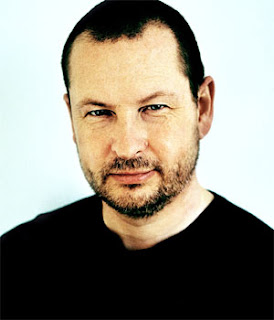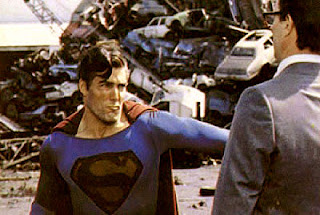The Cannes Film Festival jury is not known for being subtle. Just take a look at the experience Antichrist had with it. The members of the jury hated Antichrist so much that they gave the film a special award for its "misogynistic overtones." Lars Von Trier, during the press conference for the film, became so frustrated with the journalists calling him misogynistic that he declared himself the greatest filmmaker of all time and left the room.
I suppose that's one way to call your audience stupid.
Another way to call them stupid is to make them watch a film that condemns gender expectations and the arrogance of men and, somehow, make it seem like your film is hateful toward women. How embarrassed they must be for not having understood a film's intentions. Especially a film with such clear intentions.
Lars Von Trier is known for a lot of things, beautiful imagery, strong performances, brutal endings; however, like the Cannes jury, he is not known for his subtlety. When he wanted to make a musical about capital punishment, he made Dancer in the Dark, a film with a plot so completely contrived and unbelievable that its ultimate goal feels like a slap in the face by an unconvincing preacher. And that's just one of his movies. Nearly all of them are of that nature.
Including Antichrist.
However, instead of capital punishment, Von Trier is attacking the expectations that have been placed upon the genders. More specifically, he is attacking the centuries-old conceit that men inhabit the realm of the mind, and that women inhabit the realm of the body. Or, as Trier takes it even further, that women are nature and men are spirit.
He is attacking these prescribed ideas by creating characters who totally embody these gender stereotypes. I suppose one could argue that he is not attacking anything. One could argue that he truly believes in these tropes, and that he is trying to show the world how much sense these ideas make.
And for those supposing people, they have clearly never seen the end of Antichrist.
Strange as it may sound, many of the people who criticized the film for its offensive treatment of women either walked out of their screening or never even watched the film. They researched the basic plot, gathered some dialogue from the film--as well as their hatred for Von Trier's personality--and soared off into an oasis of self-important think-piecery.
 |
| "I'm more enlightened and progressive than this Danish, misogynistic monster!" they yelled to themselves as they typed away on their keyboards made of soy plastic. |
I suppose I should offer up the plot of the movie to those of you who have not seen it. I'll be quick.
There are two characters--He and She--played by Willem Dafoe and Charlotte Gainsbourg. He is a psychotherapist, She is a graduate student. The film begins with a prologue, He and She have sex as their young son, in the other room, makes his way to an open window and falls to his death. After their son's funeral, He and She deal with grief in their own ways. He, after crying at the funeral, shows very little outward emotion concerning his grief, while She is crippled by her overwhelming sense of loss. After She is released from the psych ward of the hospital, He decides that he will continue her treatment in a cabin they own in the woods. He tries to "cure" her by forcing her to confront all of her greatest fears. However, instead of helping her, the treatment seems to make her delusional and violent. And, not to give too much away, lets just say that things get out of hand.
The film is comprised mainly of conversations between He and She. These conversations usually surround the very theme of the movie. She talks about her thesis on gynocide (spelled correctly, look it up) and how nature is Satan's church and He talks endlessly about how reasonable and intelligent he is. As the film continues, she begins to discuss how she can't stop buying into the beliefs of these Medieval philosophers whom she's been reading. She claims that women might actually be everything they've been reduced to over the centuries. He calls her crazy, that she's been brainwashed by articles she was supposed to be critical of.
However, shortly after, He seems to be completely fine with She's drastic change in philosophy. After all, he's been acting exactly as a man is expected to act. He has shown no emotion other than anger, retained a healthy amount of arrogance, and has only succumbed to his sexual desires when his wife has forced herself upon him.
In other words, He and She become the quintessential Medieval couple. And yes, I know how this is starting to look. What I've described from the film sounds, and definitely is, very offensive. Yet I am only describing the first two acts of the film. All of these elements are surprisingly offensive. No self-respecting feminist should ever try to defend a movie with this plot. But...
The final scenes of the movie, particularly the final three shots, should drive home what the audience has been told all along. Lars Von Trier does not believe in what these characters are saying. It's like reading Huckleberry Finn and calling Mark Twain a racist. It just doesn't work that way. The film is so blatantly criticizing unfair gender expectations that the only way somebody could mistake the film's message is to just not watch it.
Yes, the characters are completely offensive representations of men and women. They're supposed to be. The film's primary intention is rabble rousing. You're supposed to scream at the screen. Von Trier wants you to watch the movie through your fingers as you constantly look away in fear that you'll see something terrible. He's like that. That's just the kind of guy he is. And while the film may be trying to offend you, its ultimate goal is not offensive. It's just a difficult, painful journey.
My problem with the film does not lie in its message because that message is actually pretty common: men and women should be treated equally by society. My problem lies in the question of audience. Who is the audience for this film?
Who watches a Lars Von Trier film and does not already believe that men and women should be treated equally? Surely a film with such grotesque imagery and difficult subject matter is, by nature, given a very limited audience. And that limited audience, such as Cannes filmgoers, is surely caught up on modern sexual politics. Why must they need to be reminded that Medieval sexual politics were terribly impractical?
Oh, wait, they didn't get it. You win, Lars.









